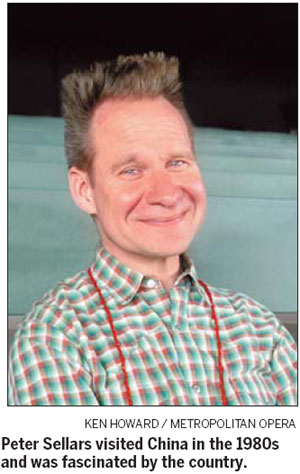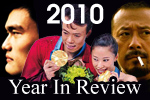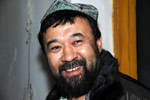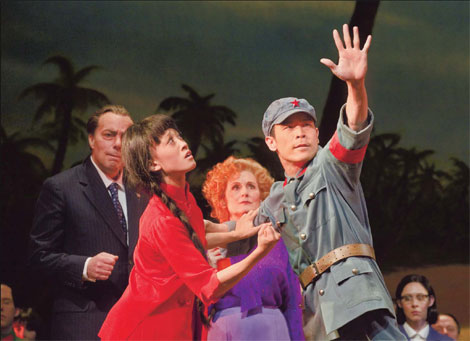Life
Met celebrates Nixon in China
Updated: 2011-02-11 07:47
By Chen Weihua (China Daily)
|
|
John Adams' musical masterpiece has made its long-awaited debut at New York's Metropolitan Opera, and a prominent feature of it is the revolutionary ballet The Red Detachment of Women. Chen Weihua reports from New York.
American theater director Peter Sellars was working on Haydn's Armida and reading Henry Kissinger's memoirs when he suggested an opera about former US president Richard Nixon's historic trip to China.
He proposed the idea to young composer John Adams at a New Hampshire music festival in 1983. Adams, less known then, was skeptical at first but he soon realized it was a great idea to "find our mythology in our contemporary history".
The opera Nixon in China made its world premiere at the Houston Grand Opera, 1987, with Adams' score, poet Alice Goodman's libretto, Mark Morris' choreography and Sellars' staging.
Over the last 24 years, the opera has been performed by opera houses across the world and is considered a masterpiece. But it wasn't until Feb 2, the eve of Chinese new year in 2011, that Metropolitan Opera at Lincoln Center in New York staged the piece.
Met general manager Peter Gelb, said that when he took office in 2006, he wanted to redress the opera house's most significant repertoire omission - the absence of works by Adams - and what he had in mind was Nixon in China.
But since Adams had just launched his Doctor Atomic, that opera became his premiere at the Met. This time, Nixon in China was Adams' premiere at the Met as a conductor, and he wielded his baton to his own score.
It was also Sellars' premiere at the Met as a director. As a young man in his 20s, Sellars traveled to China in the 1980s to see a country he was fascinated with. He loved Mao Zedong's speech in Yan'an.
"I really believed, as a young American, that Mao talked about the role that culture should play in the life of the people in working society. I was very moved by those talks," the 53-year-old says.
He also loved China's revolutionary ballet, which he believes is much better than Giselle.

"Giselle and Swan Lake present women as pathetic things, who are constant victims This is not a useful social program for anyone," he says.
On the contrary, The Red Detachment of Women gave women a positive and powerful role. "They weren't just victims. They were strong and active," Sellars says, adding he believed revolutionary ballet solved the problem of Western ballet rather brilliantly.
"There was a subject matter. One of the things that drove me crazy about the official culture of the Lincoln Center variety is that you can admire it as technique, but what is the subject matter? What are they talking about? Absolutely nothing," he says. His efforts to stage a revolutionary ballet in New York in the 1980s were foiled due to opposition on ideological grounds.
Anyone who watches Nixon in China, which is scheduled for six shows at the Met this month, will probably be most impressed by the scenes from The Red Detachment of Women, which Nixon, his wife Pat and Kissinger, were invited to watch during the five-day landmark trip in February 1972.
The three-act opera opens with Air Force One, carrying Nixon and his group, landing in Beijing and being greeted by former premier Zhou Enlai. Then, Nixon meets Mao for a long conversation about philosophy and politics. The banquet that follows is marked by toasts between Zhou and Nixon.
After the show's first intermission, Nixon and his wife are shown visiting a glass factory, a pig farm, a primary school, the Summer Palace and the Ming Tomb, in Beijing. In the evening, they are treated to a performance of The Red Detachment of Women.
Sellars then arranges to have the Nixons involved in the plot after they watch the heroine, Wu Qionghua, beaten by the ruthless landlord Nan Ba Tian.
You may be able to tell that while Kissinger, the only one alive today among all the characters in the opera, is popular among Chinese, he is surely not a favorite of Sellars, who gives him just a few lines and a relatively minor part to play.
Sellars has injected some profound meaning in the opera when the Red Army officer Hong Changqing rescues Wu Qionghua. Hong reaches out his arm and finds Nixon handing a gun to him. Nixon's wife Pat brushes his hand aside and hands over a glass of juice. That juice helps resuscitate Wu.
Sellars explains this shows that Americans have an interventionist policy and arm groups and countries they don't fully understand.
The final act of the three has a comedic and imaginative tone, and is when the major characters in the opera ponder what they have done in life.
Under Met's Live in HD Series program, Nixon in China will be broadcast live in hundreds of movie theaters worldwide on Feb 12.
While most operas focus on traditional themes, Sellars said Nixon in China features timely and important subject matter.
"There is no bigger topic in America. There were decades that you did not recognize one-fifth of the world's population. It's kind of incredible," Sellars says.
He said much of the material in the opera was not found in Kissinger's memoir and there were limited sources to understand what was going on in 1985, when the opera was written. Sellars described the opera as not just historical but, rather, a forward-looking piece.
"The art form of the historical novel is primarily not because you are obsessed with history, but you really want to find a path forward and understand where we are now," he says.
He praises Adams for creating a living art form and weaving a musical tapestry in which the destiny of Chinese and Americans is inseparable. "It is not their destiny to veer off and go in opposite directions," he says.
A director known for his interest in politics, Sellars says the character of Nixon, in the opera, was trying to lecture China, but now all the references take on new meanings.
"China is now our banker," he says.
Specials

Spring Festival
The Spring Festival is the most important traditional festival for family reunions.

Top 10
A summary of the major events both inside and outside China.

A role model
Alimjan Halik had been selected as the "Cyberspace Personality Who Moved the Hearts of the Chinese in 2010".
